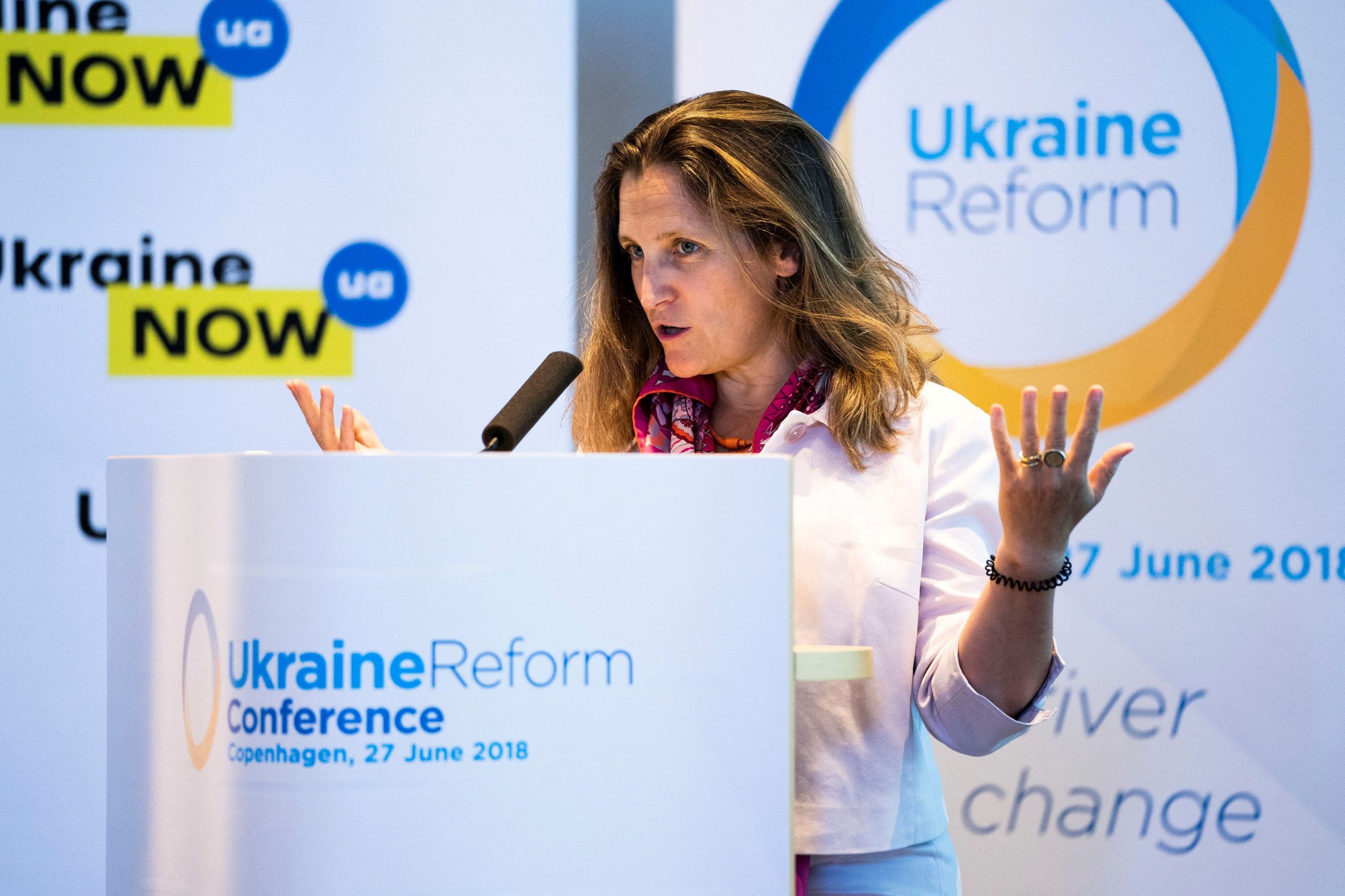Canadian Finance Minister Chrystia Freeland played a key role in getting sanctions on Russia’s central bank in place, two sources said, and has been a leading voice against Russian aggression as a vocal member of the country’s large Ukrainian community.
Freeland, who is also deputy prime minister and second in power only to Prime Minister Justin Trudeau, has made impassioned statements in support of Ukraine to G20 colleagues and the Canadian public.
Canada has closed airspace and ports to Russian vessels, is sending lethal military aid to Ukraine, curbed oil imports and asked the International Criminal Court (ICC) to probe alleged war crimes by Russian forces.
The crisis is personal for Freeland. Both of her maternal grandparents were born in Ukraine, and she has said she speaks Ukrainian at home with her children. Her mother, Halyna Chomiak Freeland, helped draft the inaugural Ukrainian constitution, according to her 2007 obituary https://www.legacy.com/obituaries/edmontonjournal/obituary.aspx?pid=90579918, and as a university student, Freeland advocated for Ukraine’s independence from the Soviet Union.
Freeland’s voice cracked as she made an emotional plea to Canada’s 1.4 million-strong Ukrainian community on Thursday, the day Russia invaded.
“Now is the time for us to be strong as we support our friends and family in Ukraine. Now is the time for us to remember,” Freeland said, switching into Ukrainian, “Ukraine is not yet dead.”
Canada, the European Union and United States have imposed sanctions on Russia since the attack, and on the weekend blocked some Russian banks from the SWIFT global payments system.
On Monday, they restricted Russia’s ability to deploy $640 billion of foreign exchange and gold reserves, forcing the central bank to more than double its key policy interest rate and introduce some capital controls as the rouble’s value collapsed.
This was considered an extreme measure by the G7 just over a week ago, and Freeland advocated getting the measure in place quickly to restrict the central bank’s access to foreign reserves before markets opened on Monday, two senior Canadian government sources, who were not authorized to speak publicly, told Reuters.
“We have hamstrung Russia’s central bank, thus depriving (President Vladimir) Putin of access to his war chest,” Freeland told lawmakers in Ottawa on Monday.
Ukrainian Minister of Culture Oleksandr Tkachenko, in a Feb. 22 conversation with Freeland two days before the all-out invasion, urged freezing the Russian central bank foreign reserves before they could be moved.
Freeland then “had a number of calls with American counterparts” starting on Feb. 22 that culminated in her sending “something on paper to the United States outlining what it would look like” two days later, on Thursday, one source said.
Officials in Washington said months of work on the measure, announced on Saturday, accelerated over the weekend after European officials indicated Russia was seeking to shift assets back to Russia or other safe havens.
Referring to the coordinated economic sanctions, one senior Biden administration official told reporters on Monday: “We were ready, and that’s what allowed us to act within days, not weeks or months, of Putin’s escalation.”
Adrienne Vaupshas, a spokesperson for Freeland, declined to comment on the minister’s efforts as outlined by sources.
“We will continue to work in lockstep with American and European leaders to sanction President Putin and his hangers-on for their unprovoked and barbaric invasion of Ukraine,” Vaupshas said.
The White House declined to comment on Freeland’s specific role.
‘MOVED TO TEARS’
Freeland is seen as the leading candidate to succeed Trudeau as Liberal Party leader. Her efforts have been noticed by the politically active Ukrainian Canadian community, which represents almost 4% of the population, and who mostly live in prairie provinces and in Ontario.
“Deputy Prime Minister Chrystia Freeland is a source of inspiration and pride for all Ukrainian Canadians,” said Orysia Boychuk, an Alberta official with the Ukrainian Canadian Congress. “When Freeland spoke in Ukrainian to her community, many of us were moved to tears.”
Last month, Freeland strayed from the G20 finance ministers’ traditional script to give an “impassioned” warning to Russian counterparts not to invade Ukraine.
In 2014, Russia banned Freeland, along with 12 other Canadians, from entry in retaliation for Canadian sanctions after Russia’s invasion of Crimea. She said then it was “an honour” to be on Putin’s sanction list. Freeland worked for Reuters from 2010-2013.
“If Russia continues this barbaric war, the West is united,” Freeland said at Toronto rally on Sunday. “The West is relentless. And we will cut the Russian economy off from contact with our own.”
(Reporting by Steve Scherer in Ottawa and Rod Nickel in Winnipeg; Additional reporting by Andrea Shalal in Washington; Editing by Amran Abocar and Lisa Shumaker)
